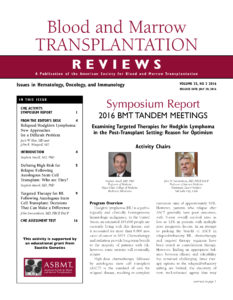Click the “Start Activity” button to indicate you have reviewed the CME information for this activity.
Faculty
Stephen Ansell, MD, PhD
Professor of Medicine
Mayo Clinic College of Medicine
Rochester, Minnesota
John W. Sweetenham, MD, FRCP, FACP
Professor of Internal Medicine
Huntsman Cancer Institute
Salt Lake City, Utah
Release date: July 20, 2016
Expiration date:July 20, 2017
Program Overview
Hodgkin lymphoma (HL) is a pathologically and clinically heterogeneous hematologic malignancy. In the United States, an estimated 185,000 people are currently living with this disease, and it accounted for more than 9,000 new cases of cancer in 2015. Chemotherapy and radiation provide long-term benefit to the majority of patients with HL; however, some patients will eventually relapse.
High-dose chemotherapy followed by autologous stem cell transplant (ASCT) is the standard of care for relapsed disease, resulting in complete remission rates of approximately 50%. However, patients who relapse after ASCT generally have poor outcomes, with 5-year overall survival rates as low as 12% in patients with multiple poor prognostic factors. In an attempt to prolong the benefit of ASCT in relapsed/refractory HL, chemotherapy and targeted therapy regimens have been tested as consolidation therapy. However, finding an appropriate balance between efficacy and tolerability has remained challenging. Since therapy options in the relapsed/refractory setting are limited, the discovery of new, well-tolerated agents that may improve the benefit of ASCT has been a high priority.
One of the most recent therapies to be approved for the management of HL was brentuximab vedotin. This antibody-drug conjugate combines an anti-CD30 monoclonal antibody with a cytotoxic chemotherapy to deliver a targeted, cytotoxic payload to tumor cells. In its pivotal study for HL treatment, brentuximab vedotin demonstrated high response rates and favorable overall survival in patients who had failed prior chemotherapy and ASCT. More recently, researchers have explored brentuximab vedotin as consolidation therapy post-ASCT. The results of this study showed that brentuximab vedotin improves progression-free survival in patients with risk factors for progression with manageable toxicity.
Researchers also have placed a high priority on discovering factors that can help predict the risk of relapse following ASCT. Such a risk assessment would help identify patients for whom consolidation therapy should be considered. Fluorodeoxyglucose-positron emitting tomography (FDG-PET) has been established as an important prognostic tool for early HL. More recently, however, it has been studied as a tool for assessing the risk of ASCT failure. Specifically, patients with residual HL detectable by FDG-PET after high-dose chemotherapy are at greater risk for progression following ASCT.
Learning Objectives
Upon completion of the program, participants should be able to:
• Define patients with high-risk Hodgkin Lymphoma (HL) due to known risk factors both at the time of initial diagnosis, as well as the relapsed/refractory setting
• Describe the role of interim fluorodeoxyglucose-positron emission tomography (FDG-PET) to assess responsiveness of the disease to therapy
• Consider which patients may be candidates for targeted consolidation therapy post-autologous stem cell transplant (ASCT)
• Discuss the targeted therapies currently approved or in clinical trials for post-transplant therapy
Target Audience
This activity has been developed and is intended for hematologists, oncologists, bone marrow transplant (BMT) specialists and other healthcare professionals involved in the treatment of patients with HL.
Accreditation Statement
This activity has been planned and implemented in accordance with the accreditation requirements and policies of the Accreditation Council for Continuing Medical Education through the joint providership of The Medical College of Wisconsin and Carden Jennings Publishing. The Medical College of Wisconsin is accredited by the ACCME to provide continuing medical education for physicians.
AMA Credit Designation Statement
The Medical College of Wisconsin designates this enduring material for a maximum of 1.0 AMA PRA Category 1 Credit™. Physicians should claim only the credit commensurate with the extent of their participation in the activity.
The Medical College of Wisconsin designates this activity for up to 1.0 hours of participation for continuing education for allied health professionals.
This enduring material is approved for 1 year from the date of original release, July 20, 2016 to July 20, 2017.
Off-Label/Investigational Use
This educational activity may contain discussion of published and/or investigational uses of agents that are not indicated by the FDA. The opinions expressed in the educational activity are those of the faculty and do not necessarily represent the views of the Medical College of Wisconsin, Carden Jennings Publishing, or Seattle Genetics.
Before prescribing any medication, physicians should consult primary references and full prescribing information. Please refer to the official prescribing information for each product for discussion of approved indications, contraindications, and warnings. Further, participants should appraise the information presented critically, and are encouraged to consult appropriate resources for any product or device mentioned in this activity.
CJP Medical Communications Disclosure
The employees of CJP Medical Communications have no financial relationships to disclose.
Faculty Disclosures
Consistent with the current Accreditation Council for Continuing Medical Education policy, the CME Provider must be able to show that everyone who is in a position to control the content of an individual educational activity has disclosed all relevant financial relationships. The CME Provider has a mechanism in place to identify and resolve any conflicts of interest discovered in the disclosure process. The presenting faculty members have all made the proper disclosures, and the following relationships are relevant:
Jack W. Hsu, MD, has no relevant financial relationships to disclose.
John R. Wingard, MD, has no relevant financial relationships to disclose.
Stephen Ansell, MD, PhD, has disclosed that he has received research funding stipends from Bristol-Myers Squibb, Seattle Genetics, and Celldex.
John W. Sweetenham, MD, FRCP, FACP, has disclosed that he has received speaker honoraria and advisory board honoraria from Seattle Genetics.
Click the “Start Activity” button to indicate you have reviewed the CME information for this activity.

